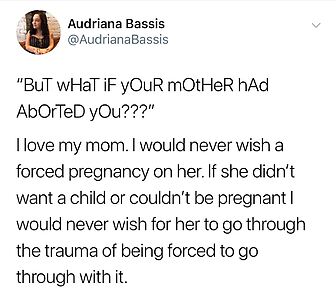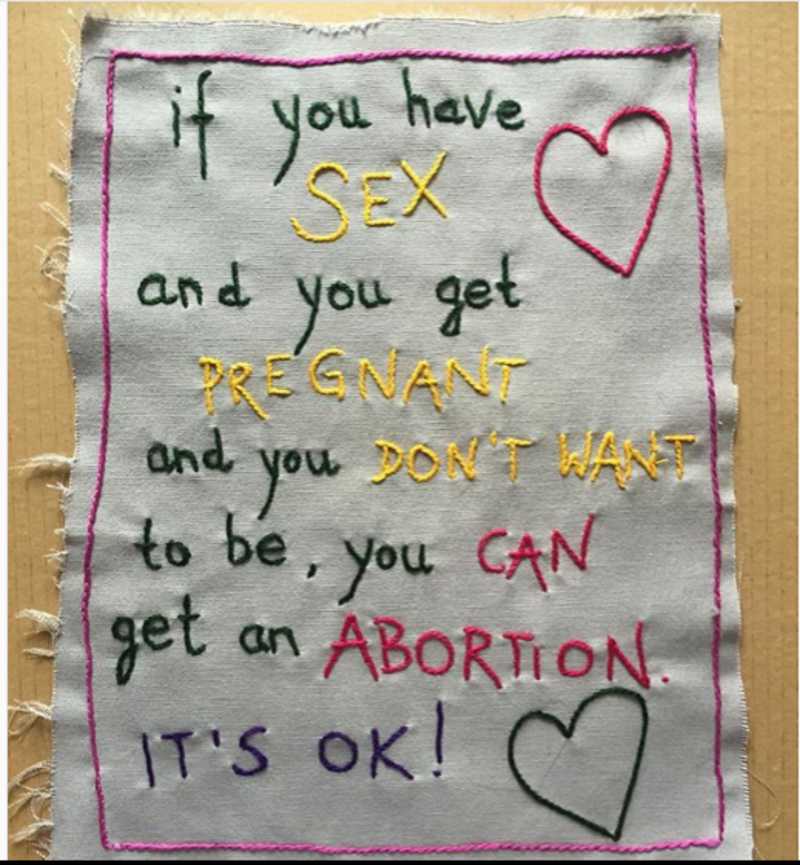Unhelpful Comments Directed at People Celebrating Abortion and How to Respond to Them with Facts and Science (If That’s Something You Feel Like Doing)
mercredi, mai 1, 2019 blog Share
Responding to comments like these is not for everyone.
Disclaimer before you read: Responding to comments like these is not for everyone. If you don’t wish to expose yourself to anti-choice negativity and potentially triggering language, feel free to skip this post! If you’d like some factual responses to tuck away and save for the right moment, read on!
The SASS social media team recently made an abortion-positive post on Facebook. It went viral, and a significant amount of comment moderation was needed to ensure that our page remains a safe and welcoming place. While reading through each comment (yes, we read and are continuing to read all of them), we noticed plenty of positivity and support, but there were also several negative comment trends that continued to pop up. The following eleven negative comments were expressed with the most frequency, and we’d like to address them.
1. Why don’t you just use contraceptives? There’s no reason to have an unplanned pregnancy in this day and age. They’re free! You’re just advocating for irresponsible sex.
Of course we aren’t. Contraceptives are an important part of reproductive justice that everyone should have access to.
There are about 61 million women* of reproductive age in the U.S. About 70% of these women (43 million) are at risk of an unintended pregnancy (in other words, they’re sexually active but do not want to become pregnant). Only 10% of these women are not currently using any method of contraception.
Even with perfect use, contraception is not 100% effective. For example, with perfect use, male condoms have a failure rate of about 2%. With typical use, the failure rate increases to 13%. The pill has a perfect use failure rate of 0.3%, but a typical use failure rate of 7%.
Furthermore, many women may not be able to or may not want to use some forms of birth control. Hormonal forms of birth control like the pill, the patch, IUD, and injection can have unpleasant side effects and can raise the risk of blood clots or ectopic pregnancy.
While the Affordable Care Act requires most private health plans to cover a designated list of contraceptive methods (many times generic brands, which don’t always jive with people’s bodies in the same way that brand-name medications do), only 29 states have laws in place requiring insurers to cover a full range. The most effective, long lasting methods can cost hundreds of dollars up front, and even relatively “inexpensive” methods such as condoms can cost a substantial amount of money over time; the average woman in the United States who desires to have two children spends about thirty years of her life trying not to get pregnant.
Sources: Guttmacher Institute, Office on Women’s Health
2. If you’re not ready to have a kid, don’t have sex (or some version of “keep your legs closed”).
Sexual activity is a part of human development for most people. On average, people in the United States have sex for the first time around age 17. Nearly half of unmarried 15-19-year-olds have sexual intercourse. Society would not consider many of them to be “ready” to be parents, financially or otherwise.
Some people want to wait until the appropriate time in their lives to become parents (as judged by them), and some people never want to be parents. People have the right to parent if, how, and when they want to.
Also of note, adults continue to have sex throughout their lives, long after they have stopped having children. Most sex on planet Earth is not for procreative purposes. Human beings are fundamentally social; sexual desire includes desire for physical pleasure as well as connectedness with others.
Basically, people have sex. People will continue to have sex because they’re people. Sex can be fun and pleasurable, and people are allowed to (and do) have it for reasons other than making babies. Just because you’re uncomfortable with the concept of abortion doesn’t mean people aren’t allowed to have sex unless they’re 100% ready to have a kid.
Sources: Guttmacher Institute, Lifehacker, Psychology Today
3. Abortion should not be used as a form of “birth control” (or some version of “you shouldn’t be allowed to have multiple abortions”).
Abortion is expensive and often hard to access. It is clearly not a feasible option for long-term birth control, and women don’t use it as such because women are capable of making good, informed decisions about their own bodies. Considering that most women are able to get pregnant for thirty years or more and contraceptive use is not 100% effective, the likelihood of a woman having an unplanned pregnancy in her life is very high. Yet, most women who have abortions have not had an abortion before (52%) or only one previous (26%).
4. Abortion is only okay if you were raped.
Oh, does the fetus suddenly become less of a person if you were raped? All you’re saying here is that women should be punished with an unwanted child if they had sex for pleasure, but if their bodily autonomy is violated, then and only then are they allowed the option of exercising that bodily autonomy. Hmmm.
Also, do you know how slowly our justice system works? Considering that most rapes are not reported, much less prosecuted, can you imagine having to report your rape to the police, prove beyond a reasonable doubt that you were actually raped, and then go through a legal process (expensive) and conviction of said rapist before actually being able to terminate the pregnancy (also really expensive)? Now imagine your rapist is someone you know, like a family member. Imagine that you are of low-socioeconomic status. Imagine your rapist is your abusive partner or husband, and you fear retaliation (as at least 20% of people who do not report assaults do). What exactly would this legal process look like? I’ll give you a hint: it wouldn’t look like anything because it’s completely impractical.
Next.
Sources: RAINN, The Atlantic, common sense
5. You are a murderer.
First, no.
Approximately 40%-60% of embryos are lost between fertilization and birth. There has been no coordinated effort to find out why this is, or to attempt to save these embryos. Why is this, if every fertilized egg is a human life? Could it be that an embryo and an infant are obviously not the same thing?
Even if we do accept the argument that embryos are people, no one has the right to use your body without your consent.
An embryo/a fetus poses a risk to a woman, for the simple fact that it is using her body. If she lives in the United States, she has the added bonus of being pregnant in the country with the worst maternal mortality rate in the developed world. People have a right to life, but they do not have a right to live inside someone else’s body, particularly when there is a risk of harming that person.
People’s bodies belong to them, even after death. Doctors cannot even use organs from a deceased person to save someone else unless that person has agreed in writing prior to their death. The use of pregnant bodies/organs by a fetus does not require any such agreement.
Also, fetuses cannot live unsupported, even with a respirator, before 21 weeks’ gestation. According to scientific consensus, they cannot feel anything like pain until at least 24 weeks because they do not have the brain connections to do so. They are not sentient. Pregnant people have a right to bodily autonomy; a fetus has no right to a body without the owner of that body giving consent.
Sources: NCBI, Harper’s Bazaar
6. I/my friend/someone I heard about regret(s) their abortion.
While all feelings after an abortion are okay and valid, the most commonly reported feeling is relief. In fact, a study done by researchers at the University of California San Francisco School of Medicine found that more than 95% of US women surveyed did not regret their abortions. Negative feelings after an abortion usually stem from societal abortion stigma and a lack of social support. If you or someone you know have unresolved feelings after your abortion, there are many available resources you may want to take advantage of. That is not the type of service provided by Women Help Women.
Source: PLOS
7. What if a father does not want to keep the child, but the mother does? Why does he have to pay child support? Seems like a double standard.
First of all, the person carrying the pregnancy is the only one to have a say over whether the pregnancy continues because the embryo/fetus is using their body (see above re: bodily autonomy).
Second, this issue is not really one of parents’ rights, but of children’s rights. Once a child is born, it has a right to parental support. Informal agreements about child support are possible with or without attorneys. These agreements are legal as long as they comply with state guidelines.
Source: FindLaw
8. It’s selfish of you to want an abortion. There are so many couples that can’t conceive and would love to adopt your baby. Why don’t you just put it up for adoption?
Saying that adoption is the catch-all solution for unwanted pregnancies does nothing to help any party involved. Adoption is not an alternative to abortion or pregnancy; it’s an alternative to parenting. A person who is pregnant and decides to put their child up for adoption has already put their body through the tremendous stress and danger of a full-term pregnancy and birth.
If a person opts for adoption (which is often due to the fact that they are too late in the pregnancy to access an abortion, their relationship status/support has changed or there aren’t governmental supports in place, they don’t have the money to access abortion, or they don’t know where to access abortion and are using adoption as an absolute final resort), they must undergo nine months of not only physical change, but also questions and comments from family, friends, and acquaintances about their baby plans.
The adoption process is long and stressful. Experts have found that many biological parents who opt for adoption go through years or even decades of grieving, with one study finding that three-quarters of birth mothers experience a sense of guilt or loss 12 to 20 years after placing their child up for adoption.
Though there are couples that are unable to conceive for whatever reason, we must remember that there are close to 400,000 children in state custody. Only about half of these children have plans for a permanent placement. The government does not financially prioritize foster care or child protective services, and so we find employees underpaid and struggling to make sure that the children they care for are healthy and happy. If abortion access and designated funds to social services continue to be restricted, more children will end up in a system that cannot provide adequate care for them.
Sources: Rewire, Child Welfare Information Gateway
9. I don’t think abortion should be allowed if there’s a heartbeat.
With recent technological advances, cardiac activity can be detected at around 5 ½ to 6 weeks of pregnancy, which is only about one month after conception and two weeks after implantation in the uterus (i.e. only two weeks after a missed period). With all of the current restrictions on abortion access, this is a near impossible time frame in which to realize you are pregnant, make an appointment (or in some cases more than one appointment, depending on the state in which you live), procure funds for an abortion procedure, and actually terminate the pregnancy.
As Senator Jen Jordan (D-Atlanta) stated in her speech on Georgia’s Senate floor, just because cardiac activity can be detected, it does not mean that the embryo has a fully formed heart. Cardiac cells contract. That’s just what they do. Scientists have attached cardiac cells to a spinach leaf and watched them contract under a microscope.
While a fetal heart has four chambers by the eighth week of pregnancy, a study by British researches found that it does not have fully organized muscle tissue until week 20.
To claim that a detectable heartbeat should be the cutoff for pregnancy termination is based on a misunderstanding of fetal development and the refusal to actually study and understand how a fetus forms. The only things these so-called “heartbeat bills” are meant to do are effectively ban abortion and begin a legal challenge that will end up challenging Roe v. Wade in the Supreme Court.
Sources: Worcester Polytechnic Institute, MedicineNet
10. If a fetus is not a person, why are murderers charged with a double homicide when a pregnant person is killed?
They aren’t. If they are charged in a crime related to a fetus/embryo, they might be charged with something called “fetal homicide” or receive a “penalty-enhancement” for a crime against a pregnant person, depending on which state is prosecuting them. 38 states currently have “fetal homicide” laws, with just 29 applying the term to pregnancies in any stage of development.
Source: National Conference of State Legislatures
11. What if your mother had aborted you? Funny how all people who are pro-abortion have already been born. Har har.

If I had been aborted, I would not know. I would not even know that I existed, because embryos and fetuses are not sentient beings. If I had been aborted, I would not have had to stare at my phone constantly for a month reading and deleting your ridiculous anti-choice nonsense while trying to maintain a healthy environment on our Facebook page.
So, the next time someone with bad intentions comes at you with one of these comments/questions, come back at them with a factual, informed response. Or don’t, and let us handle it.
fin
*While this blog post uses the terms “women” and “woman,” SASS/Women Help Women recognizes that transgender, intersex, and gender non-binary people also experience pregnancy and need abortion care. We work to ensure that our activism and services are gender-inclusive, and we strive to be a respectful and responsive environment to any trans* or non-binary person who contacts us. We understand that our organizational name may not convey this.
Women Help Women believes that all people should have access to medically and scientifically accurate information surrounding all aspects of abortion and reproductive health and believes women should have agency over their own reproductive choices. Our organization provides accurate information about what exactly a medical abortion with pills is, the pills’ effectiveness, how to use the pills, and what to expect after using abortion pills. If you are pregnant and do not want to be, get in touch with us online at www.womenhelp.org or by email at info@womenhelp.org.






